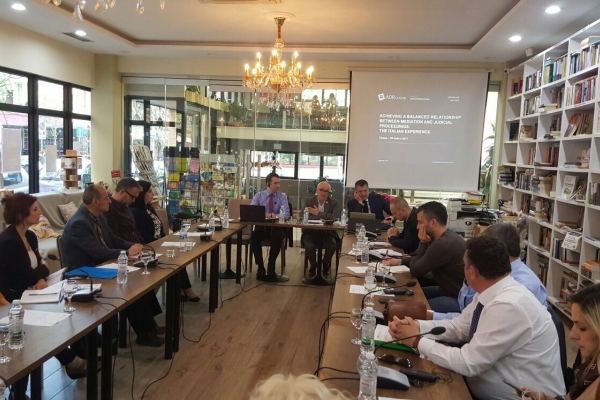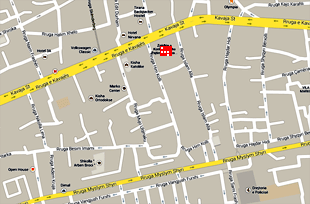Forum on The Development of Alternative Dispute Resolution/ Mediation in Civil and Commercial Disputes, March 29, 2017, Tirana, Albania

It was attended by representatives from the Albanian Parliament, the Council of Ministers, the Twining Project on Strengthening the ADR/Mediation in Albania, the Albanian National Chamber of Mediators, EBRD and lawyers, legal advisors, mediators and pedagogues.
The forum aimed at introducing the advanced and successful model for ADR/mediation in civil and commercial disputes developed in Italy and lessons learned from other EU countries and Romania. Another goal was to share ideas on how this model can adopted in Albania.
In his presentation, Mr. Leonardo D’Urso, founder and CEO of the ADR Center Italy, firstly presented their experience in the development of ADR/Mediation in civil and commercial cases. The ADR Center administers more than 5,000 mediations per year, with 30 offices established in Italy. It is the largest ADR provider based in Europe. Apart from mediation service provision, ADR Center is focused on building and enhancing ADR and mediation centers around the world, and it also conducts training programs on negotiation, persuasion and mediation based on day-to-day practice and not on books and theories.
Following, Mr. D’Urso presented on overview of in-depth analysis by the EU Parliament on the implementation of the Mediation Directive “Achieving a Balanced Relationship between Mediation and Judicial Proceedings”, conducted in 2016, referring to the four mediation models used in implementing the Directive: full voluntary mediation; voluntary mediation with incentives and sanctions; required initial mediation session and the full mandatory mediation.
He shared with the participants the mechanisms on how to measure and visualize the effectiveness of a mediation model, the opt-in and opt-out models and focused on the ‘core’ of the Italian mediation model, according to which the parties and their lawyers are required to attend an initial mediation session, and then decided to enter the full procedure or to spot. Statistics were presented on the cases managed through mediation and the increase in the number of cases mediated as an impact of the ‘required initial mediation session’.
Other topics dealt with by Mr. D’Urso related to the discussion whether mediation is a block to accessing to justice or not, the role of lawyers in the mediation process, the concerns and the need for improvements.
Mr. D’Urso concluded his presentation by referring to the lessons learnt in the past 10 years in the EU to increase the efficiency of civil justice through mediation. He mentioned that statistics demonstrates that the ‘required initial mediation session’ is the only effective and proven model that generates mediations in a short period of time. Regarding the ratio of the success rate, he mentioned that it depends on the competence and skills of the mediation and the efficiency of the administration of the mediation provider.
The Forum was followed with a presentation by Mr. Constantin-Adi Gavrila, Director of the ADR Center International. He presented on overview of the mediation development in Romania, and shared some hard lessons learnt from past mistakes. Mr. Gavrila mentioned that it is important to achieve sustainability by addressing the needs of the ones today without compromising the needs of the ones tomorrow. He mentioned that in order to have a sustainability system for mediation there is need for ‘smart’ legal framework, enable pilots before expanding, develop monitoring mechanisms before starting, keep the government involved, and allow for a testing period and evaluate. He also focused on the efficient approach to ensure quality, such as developing standards for the training curriculum, trainers and training providers; develop a realistic assessment process; allow enough practice time; and avoid conflicts of interest.
The presentations were followed by a session of comments, question and answers. The participants were interested in knowing more about the relationship between the court (the judges) and mediation, how the procedure is regulated in Italy, mentioning the difficulties that exist in Albania in this regard. The pilot experience in court-connected mediation in Albania was shared by some participants, followed by discussion why that experience was not sustained. Other issues discussed related to quality assurance of mediation, the conflict of interest, etc.
The forum was considered as first step of experience exchange and promotion of best practices that can be adopted in Albania and learning from the experience of other countries.


